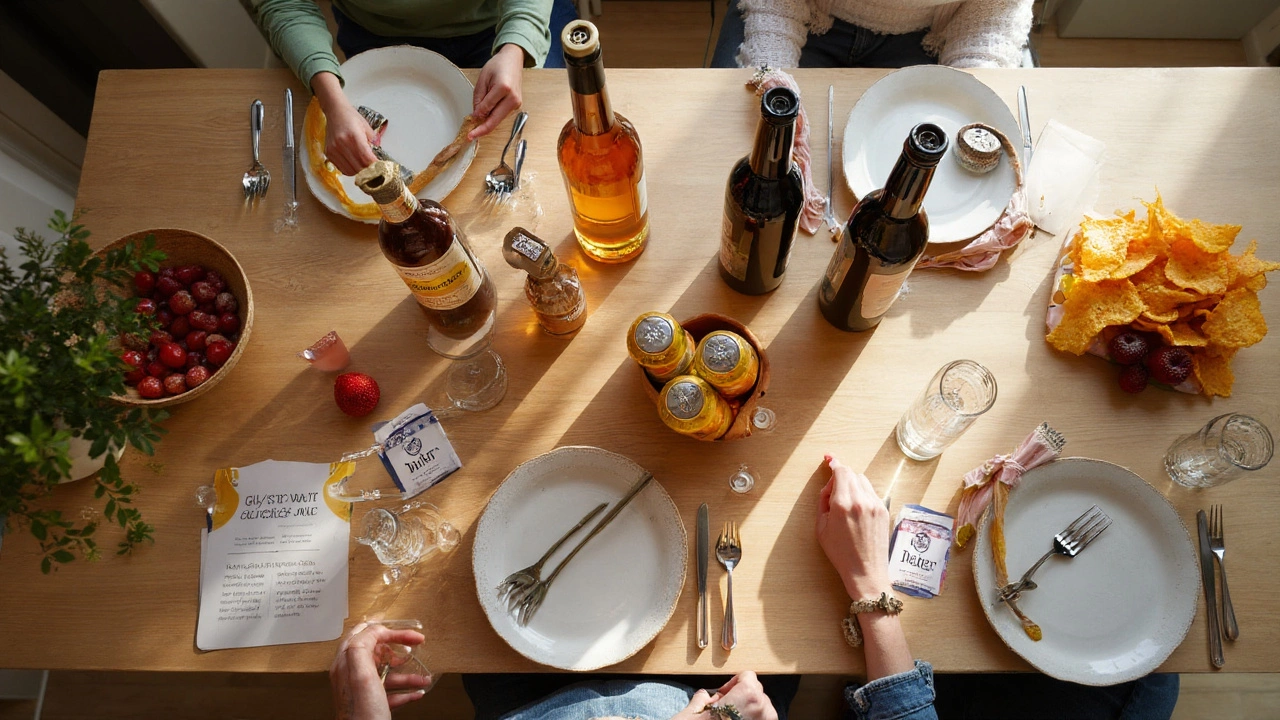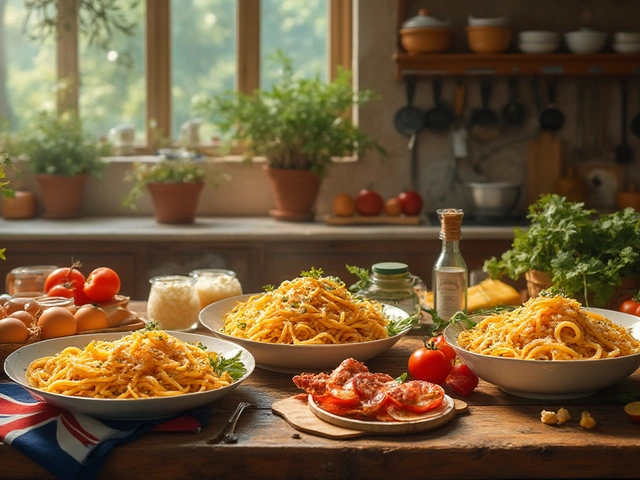
If you’ve been told to avoid gluten, you’ve probably gotten pretty good at dodging bread baskets, skipping certain pastas, and scanning ingredients like a pro detective. But let’s be real—alcohol is where things get blurry, literally and figuratively. People with celiac disease, wheat allergy, or any suspicion that gluten is plotting against them often get stuck wondering, “What can I actually drink without paying for it later?” The answer might surprise you. Not all alcohols are created equal. Stick around and you’ll never second-guess your drink order again.
The Science Behind Gluten and Alcohol
First, let’s make sense of where gluten hides. Gluten is a protein found in wheat, barley, and rye. It shows up in places you wouldn’t imagine, from soy sauce to makeup. But alcohol? Here’s where things get interesting. Alcohol is made by fermenting grains, fruits, or vegetables—and the source matters more than you think.
Gluten in booze might sound simple, but let’s not kid ourselves. Distillation changes everything. Most gluten proteins are removed during proper distillation, leaving behind what scientists call “volatile compounds”—and, ideally, zero gluten. You could line up vodka, whiskey, and gin, all made with wheat or rye, but a good distillation should strip out those gluten proteins (down to less than 20 parts per million—yep, the FDA’s gluten-free limit). Distillation is like hitting the reset button. Even the Celiac Disease Foundation says, “Distilled alcohol, even if made from gluten grains, is gluten-free.”
Here’s the plot twist—not every bottle you grab is safe. Some flavored spirits or malt beverages add stuff after the distillation. That’s when gluten can sneak back in. We’re talking about things like pre-made cocktails in cans, cheap spirits with mystery additives, or those creamy liqueurs that taste like dessert. So, while science says distilled alcohol should be safe, the real world isn’t always so tidy.
Let’s break it down with a quick fact table, just so we’re all on the same page about which kinds of alcohol start with gluten and how it changes:
| Alcohol Type | Made From | Gluten Before Processing? | Gluten-Free After? | Watch For |
|---|---|---|---|---|
| Vodka (distilled) | Potatoes, corn, wheat, rye, grapes | Wheat/rye-based: Yes | Should be (if distilled) | Added flavors |
| Gin (distilled) | Barley, wheat, rye, corn, potatoes | Wheat/rye/barley-based: Yes | Should be (if distilled) | Infusions |
| Tequila | Blue agave (not a grain) | No | Yes | "Mixto" tequila (check for additives) |
| Rum | Sugarcane, molasses | No | Yes | Flavored rums |
| Beer (regular) | Barley, wheat, rye | Yes | No | Always not gluten-free |
| Gluten-free beer | Sorghum, rice, buckwheat | No | Yes | Only when labeled "gluten-free" |
| Wine | Grapes, fruit | No | Yes | Flavored or dessert wines (some use additives) |
| Whiskey (distilled) | Barley, rye, corn, wheat | Yes | Should be (if properly distilled) | Added flavors, lower-quality brands |
| Sake | Rice | No | Yes | Very rarely, barley enzymes are used—double-check |
Notice a pattern? Alcohol made from naturally gluten free ingredients, like grapes or potatoes, rarely causes trouble. But the moment you wander into the “grain” zone, the distillation process becomes your best friend—or your enemy, if not done right.
Which Alcohols Are Always Gluten-Free? The Final Word
This is what everybody wants to know: Is there any alcohol you can drink with zero worries about gluten? The answer is yes, but with a couple of catches you need to know. If you want to play it super safe, stick with booze that is both naturally gluten free and unflavored.
- Wine: Red, white, rosé, sparkling—doesn’t matter. Wine is almost always safe. Grapes don’t contain gluten, and fermentation doesn’t add any. Rarely, some dessert or flavored wines might use an oat or barley-based fining agent, but it’s vanishingly rare—most people with celiac disease drink wine without issues. If you want to triple-check, look for bottles labeled gluten free, or stick to standard, unflavored options.
- 100% Agave Tequila: Authentic tequila must be made from the blue agave plant by law. No gluten in sight. Avoid “mixto” tequila, which mixes agave with other sugars—sometimes wheat-based sugars sneak in there. Choose bottles marked “100% agave” for a slam-dunk.
- Rum: Made from sugarcane or molasses, both are naturally gluten free. Stick to plain rums—coconut-flavored or spiced rums sometimes add grain-based flavors, so flip the bottle and read ingredients if you go for the funky flavors.
- Sake: This one’s brewed from rice, not wheat. Most sakes are safe, but a few specialty ones might use barley enzymes. If you’re dining out and want to be ultra-careful, grab a bottle labeled gluten free or ask the bar staff how it’s made.
- Fruit Brandy: Applejack, Calvados (apple brandy), slivovitz (plum), or other true fruit brandies are safe bets. They’re distilled from just fruit. The moment you start drifting toward brandy-based liqueurs—like peach schnapps—start double-checking for added ingredients.
Now, spirits like vodka, gin, and whiskey earn “almost always safe” status if they’re distilled well and don’t have sketchy flavors mixed back in. But, whiskey is a tough case—research from the Canadian Celiac Association found that gluten proteins are not present in properly distilled whiskey, but a few super-sensitive people say they react anyway. Is it a real gluten response or just the body’s confusion? Nobody really knows, so go with your gut (sometimes literally).
Beware of pre-mixed cocktails—particularly anything in a can. That “margarita” might have barley-based flavorings. Malt beverages—hard lemonade, hard iced tea, and any so-called "alcopop"—often use malt (which is just code for barley). If it doesn’t scream "gluten free" on the label, put it back on the shelf.

Surprising Facts and Hidden Hazards
So you think you’ve got this gluten free drinking thing nailed? There are still curveballs. Let’s clear up a few myths and watch out for the sneaky ways gluten can creep back in—even when you least expect it.
- Gluten-removed beer isn’t gluten free. Some companies “remove” gluten from regular beer using enzymes after brewing. But lab tests show there are still traces of gluten, and it’s enough to trigger reactions in sensitive folks. True gluten free beer is brewed from gluten free grains like sorghum or rice—don’t settle for a clever label, look for "gluten free."
- Flavored spirits = hidden risk. Peach, vanilla, cinnamon… delicious, right? These flavors often use wheat-based bases or barley malt as a flavor carrier. If it’s not specifically marked gluten free, cross it off for safety. Sticking with plain vodka or rum is boring, but safe.
- Cheap cocktails can get sketchy. Dive bars sometimes stretch a bottle with "neutral grain spirits" from who-knows-where, and pre-mixes poured from a gun behind the counter may not be gluten free. Ask what’s actually in your drink or choose spirits you trust, neat or on the rocks.
- Whiskey and celiac disease spark debate. Most major medical organizations say distilled whiskey is safe, but there are always outliers who claim reactions. Double-distilled whiskey, or corn-based bourbon (like Maker’s Mark), is usually the safest option if you want to try.
- Allergens can lurk in processing aids. Rarely, things like wheat paste can be used to seal barrels, or wheat-derived fining agents used in winemaking. If you’re hyper-sensitive, research your favorite brands—or just stick to the simplest options.
- Vodka from potatoes or corn is a no-brainer. Tito’s Handmade Vodka is famous for being corn-based and gluten free. Chopin Vodka is potato-based. Want to be as safe as possible? Stick to these brands. Bonus: both taste great in cocktails.
One last wild card—cross-contamination at bars. Glasses, cocktail shakers, or muddlers used with wheat-containing drinks, then lightly rinsed, can pick up enough gluten to cause symptoms in the super-sensitive. If you’re really worried, just ask for your drink in a clean glass or bring your own (not as weird as it sounds—some folks do it with coffee cups too!).
Tips for Choosing Gluten-Free Drinks Anywhere
Picking a drink shouldn’t feel like a science experiment, but here we are. Rule of thumb: Stick to the basics. If it says 100% agave, potato, grape, or sugarcane—it’s almost always safe. Labels like “flavored” or “pre-mixed” mean stop and check the ingredients.
- Read every label. Every. Single. Time. Just because a bottle was safe last year doesn’t mean the recipe hasn’t changed. Look for “gluten free” printed right on the front, especially with flavored options.
- Ask bartenders what brands they use. This isn’t being a pain—it’s self-preservation. Most are happy to tell you if they know. If they don’t, maybe pick something else!
- Don’t overthink “distilled from wheat.” Properly distilled spirits (like Smirnoff or Bombay Sapphire) are safe for most celiacs. If you’re ultra-sensitive, try switching to options without any gluten from the start (corn or grape vodka).
- If you find a brand you trust, stick with it. It’s way easier to be “that guy” who always brings a certain bottle to the party than to risk guessing with someone’s homebrew.
- Keep a list on your phone. Seriously. Have your go-to brands and drinks handy so you don’t freeze up when the waiter hands you that 10-page drink menu. Google updates faster than your memory on margarita number two.
- Watch for non-obvious sources. Liqueurs and specialty cordials—think Irish cream, amaretto, or anything with “spiced” or “cookie” flavors—should give you pause unless you check for gluten free certification.
- Bring your own mixers. Tonic water, soda water, and juice are usually gluten free, but oddball flavor syrups, cheap cocktail mixers, or craft tonics could have barley-based sweeteners. Stick with basics or BYO.
No one wants to play detective on a night out. Once you learn the safe zones—wine, most plain spirits, and sake—life’s way easier. If you do run into a reaction, jot down what you had to trace it for next time. And, as always, consult with a medical professional if you have severe reactions. Your health comes first. But that doesn’t mean you have to settle for water every Friday night.
Quick fact to impress friends: The U.S. Alcohol and Tobacco Tax and Trade Bureau (TTB) actually prohibits using the words “gluten free” on beer made from traditional gluten grains—even if it’s processed to remove gluten—unless it tests below 20 ppm and is brewed from gluten free sources. Makes you wonder what other secrets your liquor store is hiding, right?
Now you’ve got the details—drink smart, stay safe, and remember that simplicity is usually your best drinking buddy when it comes to gluten and alcohol.





